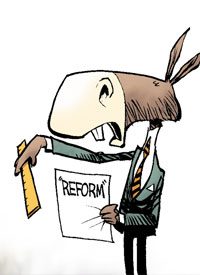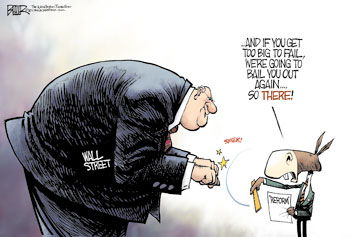
Item: The April 22 Washington Post reported that President Obama was making an “assertive stride into the debate on financial regulatory reform.” The President flew to New York “to deliver a stern address to an audience that included prominent financial executives, telling them that greater government oversight is in the best interest of the industry — and the country. ‘Unless your business model relies on bilking people, there’s little to fear from these new rules,’ he said.”
Item: The Democrats, reported the May 1 Los Angeles Times, “are seizing every opportunity to warn that failure to create more effective financial oversight could bring on a repeat of the economic crisis that has cost millions of ordinary people their homes, jobs and financial security.”
For example, Treasury Secretary Timothy Geithner, “who usually discusses controversial issues in only the most careful, often technical terms, dismissed critics in an unusually blunt manner …, saying, ‘Opponents have tried to convince the American people that these reforms will hurt Main Street or help Wall Street. Those arguments won’t work because they aren’t true.’”
Item: In Newsweek for May 10, Daniel Gross argued for financial reform, in part because “Wall Street opposes calls for change.” History, declared the business writer, “has shown that banks often don’t know what’s good for them. In the 1930s, banks opposed the creation of the SEC and FDIC, which laid the groundwork for the industry’s remarkable growth over the next 80 years.”
Correction: Those resisting the imposition of some 1,400 pages of financial regulatory legislation, one gathers from the sermonizing of the righteous backers of the reforms, are crooks, liars, or ignoramuses. The proponents of onerous and expensive government controls, on the other hand, are all honorable men looking out for our best interests. We know this because they tell us so, repeatedly and in full voice.
Yet, somehow, the observation of Emerson springs to mind: “The louder he talked of his honor, the faster we counted our spoons.”
And speaking of such honorable men, there’s Senator Chris Dodd (D-Conn.), the lead Senator behind financial reform. After a much criticized $50 billion industry-financed liquidation fund was removed from the bill recently, Dodd insisted: “We’ve ended the ‘too big to fail’ debate. So no longer do I expect any argument to be made that this bill exposes the American taxpayer.”
The is same Senator Dodd who was one of the leading recipients of political contributions from Fannie Mae and Freddie Mac — the troubled government-sponsored entities under his purview, since nationalized, that were at the heart of the housing bubble. He has been plagued by accounts of sweetheart mortgage loan deals. Less than two months before the government deemed it necessary to start bailing out Fannie and Freddie in 2008, the Honorable Mr. Dodd declared: “To suggest somehow that [Fannie Mae and Freddie Mac] are in trouble is simply not accurate.” Such a checkered history and evidence of fatuity might have embarrassed a less honorable man.
 Fannie and Freddie are perfect examples of entities given a pass as “too big to fail.” Accordingly, taxpayers are being bled white to cover their losses. The Congressional Budget Office estimates that it will cost $389 billion to bail them out by 2019. They are not covered by the Dodd bill. “Unreformed, they are sure to kill taxpayers again,” observes the Wall Street Journal. The Obama administration, notes the paper, “won’t even put the companies on budget for fear of the deficit impact.”
Fannie and Freddie are perfect examples of entities given a pass as “too big to fail.” Accordingly, taxpayers are being bled white to cover their losses. The Congressional Budget Office estimates that it will cost $389 billion to bail them out by 2019. They are not covered by the Dodd bill. “Unreformed, they are sure to kill taxpayers again,” observes the Wall Street Journal. The Obama administration, notes the paper, “won’t even put the companies on budget for fear of the deficit impact.”
Nor do Dodd’s assertions about the taxpayers’ supposed lack of exposure square with the facts. Indeed, the measure virtually assures that risky lending practices will continue, with the government back-stopping the action; it would also create what critics term “Fannie Mae 2.0.” As noted in the Heritage Foundation’s “Foundry” blog:
The problems with the Dodd bill go beyond its failure to let Fannie and Freddie wither into extinction. While Dodd has agreed to get rid of the $50 billion bailout fund, the underlying bailout authority still remains. Now taxpayers are expected to front the government money while firms are liquidated. But the irresponsible creditors who let those firms borrow money irresponsibly would still be eligible for taxpayer bailouts. According to the Washington Post, “a failing firm would be forced to pay back the government any money they received above what they would have gotten under a bankruptcy proceeding.” But how does the government know what creditors would have got if the company went into bankruptcy?
While there are flourishes of misdirection about punishing big firms on behalf of the little people, this is largely lip service for the naïfs. The legislation, as is typical, is being sold under false pretenses. Newsweek’s business writer may prefer to pretend otherwise, but bureaucrats really do not know how to run intricate markets better than the markets would if allowed to operate freely. As demonstrated in any number of historical accounts, influential business interests have long colluded with government to exclude competitors. During the 1930s, the SEC enforced price-fixing on behalf of Wall Street against the interests of investors, and the creation of the FDIC transferred risks from depositors to taxpayers, a move that eventually cost hundreds of billions of dollars in the savings and loan bailout. (For details and citations see, for example, FDR’s Folly by Jim Powell.)
Demagoguery still works, however. What the Treasury Secretary says is one thing, but what he does is something else. As Cato Institute senior fellow Alan Reynolds has noted, the Obama team has actually made big banks even bigger. Geithner and others, he writes, have spent “the past two years using arm-twisting, sweetheart deals and FDIC guarantees to make sure the biggest banks became much bigger — by taking over failing banks, brokerage house and mortgage lenders.”
The reform is filled with loopholes and exclusions; it restricts credit and targets real competition. As summarized by Richard Rahn, chairman of the Institute for Global Economic Growth, “The ‘Dodd financial reform’ bill … will make it illegal for 99.6 percent of the population to invest in needed new and promising start-up companies while at the same time ensuring that the 33 largest banks, which control 92 percent of all bank assets, will be required to purchase more federal government debt before giving loans to businesses and individuals. Quite simply, the government is continuing to practice financial fascism.”
Even when he was taking some public heat, the head of Goldman Sachs, Lloyd Blankfein, admitted to a Senate subcommittee: “The biggest beneficiary of reform is Wall Street itself.” Imagine.
As former Oklahoma Representative Ernest Istook explained in the Daily Caller:
Obama claims that so long as taxpayer money doesn’t go directly to a company or to its shareholders, it’s not a bailout. But he considers it okay to send billions to pay off that company’s creditors — who typically are big companies and Wall Street firms. To the rest of us, paying a company’s debts IS the bailout, as we’ve already seen happen multiple times….
Obama’s tough talk against Wall Street draws headlines. But when whipping boy Goldman Sachs says they like the proposed punishment, they’re not being masochists. They know that they’re getting a government guarantee that they and their friends — as creditors — won’t suffer losses when a business partner goes under.
The financial regulatory bill will lead to more harm should it become law. The overall objective doesn’t change: privatize profits and socialize risks. When the smoke clears and the mirrors are put away, the true costs would be borne by Main Street and the taxpayers, not the “Wall Street” bogeyman.
— Photo: AP Images



